Open Justice, Gender, and Data for Social Good - Open Gov #06
We highlight news that evidences the need for governmental openness. October 2021.
Available in:
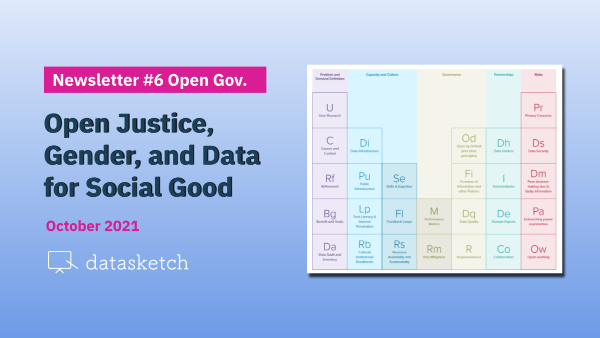
Have you reached us through social networks, or have you been forwarded this newsletter and want to receive it in your email twice a month? Subscribe!
We are Laura Tamia Ortiz, Gabriel Jiménez, María Juliana Rodríguez and Juan Pablo Marín Día, a part of the Datasketch Open Government team. If you want to read previous issues, you can do it here: Open Government Newsletter.
#NEWS
This week we highlight four news items, not the most positive, but proving the need to continue working at all levels to create participatory and transparent policies to promote democracy and the pursuit of the common good.
Hidden Interests: Judges with Financial Conflicts
The Wall Street Journal analyzed legal and financial records in the United States for years. They found that more than 130 federal judges broke the law, improperly hearing 685 cases between 2010 and 2018. In addition, they or their family members owned stock in companies that were parties to the case. Four hundred fifty-seven of the rulings were favorable to those firms. In addition, they found that 60 judges traded stock in companies with ongoing lawsuits in 170 cases.
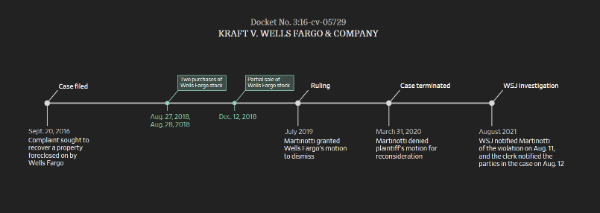
As Confilegal explains in this article (es), “Although there are no laws prohibiting judges from being shareholders and owning stock in companies, the code of conduct for federal jurists requires judges to refrain from prosecuting cases in which they have any financial interest.” Most of the judges consulted by The Wall Street Journal said they heard the cases because of clerical error assignments.
The research, published in late September, was made possible because judges are required to post their annual disclosure of financial interests and the use of conflict-of-interest software. It helps analyze the problems afflicting the judiciary, the lack of effective control to avoid interference from private power, and the importance of transparency and openness in the judicial system.

Glass ceiling and incomplete data
In Spain, an Equality Law states that public authorities “shall endeavor to comply with the principle of balanced presence of women and men in appointments and designations to positions of responsibility that correspond to them.”
According to this research by Civio (es), most of the senior positions in the State are held by men. Of the 740 active positions as of June 31, 2021, 243 corresponded to women and 497 to men. The media company cleaned the data by their political status and name to carry out this research, which helped identify the number of active men and women. If you ever need to do something like this, at Datasketch, we have an application available that identifies gender by name.

We highlight this news as it again demonstrates the importance of opening disaggregated data as a valuable tool for accountability and identifying gaps to be closed.
In addition, as Civio explains in its methodology, it highlights the need to set the subjects of study well and to be careful both when opening public data and using them: The National Institute of Statistics (INE) provides data on women in high positions, but only takes into account members of the Government, secretaries of State, undersecretaries, general secretaries, general directorates and technical general secretaries and not all the subjects obliged to report to the Office of Conflicts of Interest (OCI), which were taken into account for the research. With the INE data, the results were much more favorable for the Spanish State, which, although it has improved, is far from meeting the target set by the Law.
Political biases on Twitter
Have you heard of algorithmic biases? If you don’t know what we are referring to, we invite you to read this post on our blog. Now that you know what they are, do you find it strange that we tell you that Twitter amplifies a specific type of tweet? Probably not, and you’re right. A team of Twitter and external consultants found that the social network’s algorithms amplify more posts from right-wing accounts and media.
The research focused on the most widespread political content from users who decided to have the algorithm show them content by relevance and not by chronological order. It took study tweets from elected officials from Canada, France, Germany, Japan, Spain, the United Kingdom, and the United States. It also examined political tweets from media outlets, using independent organizations' analyses of ideological bias as context.

This analysis, carried out between April and August 2020 and published a few days ago, is key to understanding the exposure we suffer from biases and information bubbles, which condition our understanding of the world. It allows us to have a methodological reference to study the influence of Twitter in other countries, which is essential if we want to deal with attacks on democracy. And, it demonstrates the importance of being transparent and conducting research that reveals public problems, not only in institutions but also within private companies, which greatly influence our lives.
Citizens of advanced economies are dissatisfied with their governments.
From February 1 through May 26, 2021, the Pew Research Center surveyed citizen perceptions of their political systems in 17 advanced economies. The results show that about 56% of people believe that their political system requires significant changes or reform altogether.
However, most are also skeptical about the possibility of significant change. The study states that in eight countries, half or more than half of the people are pessimistic. Other issues related to this perception are the need for economic and health care reforms.
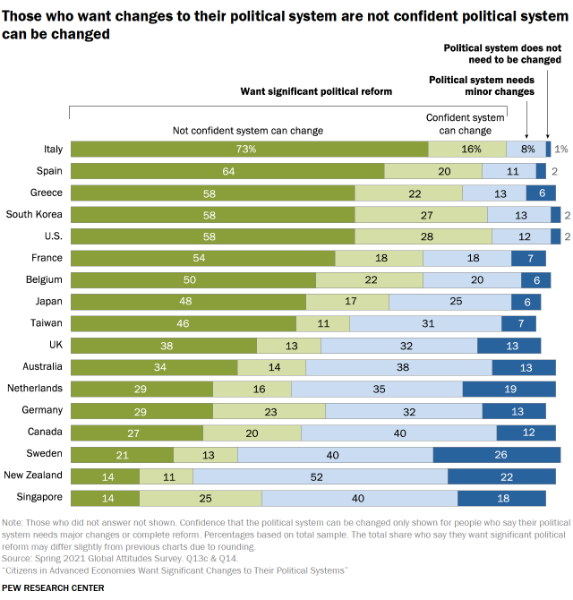
A cross-cutting theme is the impact of the COVID-19 pandemic. Pew Research found that opinions about it are shaping perceptions of political systems. For example, people who believe their country is not handling the health crisis well are more likely to favor policy reform.
The methodology used for this research facilitates access to citizens' opinions about the performance of their governments and how this affects their daily lives. In addition, it is an opportunity for these governments to take note of citizen perception in their territory and the issues on which they should work to improve.

#EVENT
Law, Justice, Racial Equity and Development
The World Bank’s Law, Justice and Development Week 2021 will be held from November 8-11. It will focus on examining the role of race in ending poverty and boosting shared prosperity.
The speakers are mainly from international human rights organizations, public entities, universities, and the judiciary from various world regions. You can learn more about the conferences, their themes, and schedules here.
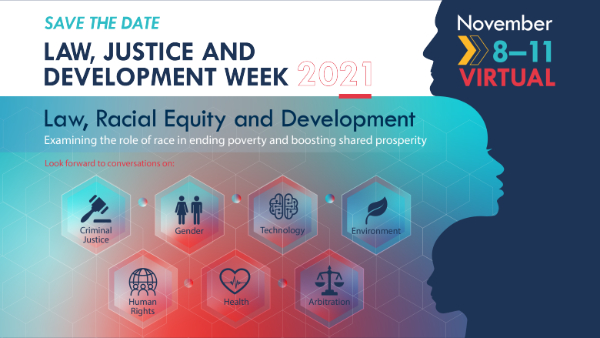
#PRIZE
OGP Impact
The Open Government Partnership Impact Awards support access to information, anti-corruption, e-government, education, fiscal openness, open data, territorial rights, among other issues.
Among the initiatives highlighted is the opening of data on local coffee production in the department of Nariño, Colombia, which sought to strengthen informed decision-making and encourage citizen participation through public-private partnerships or the Active Transparency Index of Argentina.
The winners will be announced at the OGP Global Summit, which we already announced in our newsletter #2. It will be held in December 2021, and its main themes will be civic space, public participation, anti-corruption, and innovation for digital inclusion.
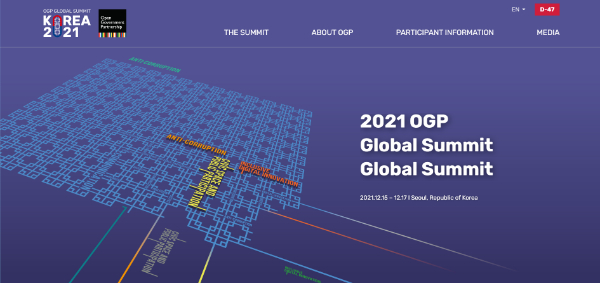
#RESOURCES
Improve your open data projects
The GovLab developed a Periodic Table that details the favorable conditions and unfavorable factors that often determine the impact of open data initiatives. The information it contains serves as a reference for improving, strengthening, and adjusting underway or planned projects.
The table, which you can consult here, has five categories: Problem Definition and Demand, Capacity and Culture, Partnerships, Risks, and Governance. Its content is based on the lab’s experience, interviews with data initiative protagonists, and secondary sources such as academic and news articles.
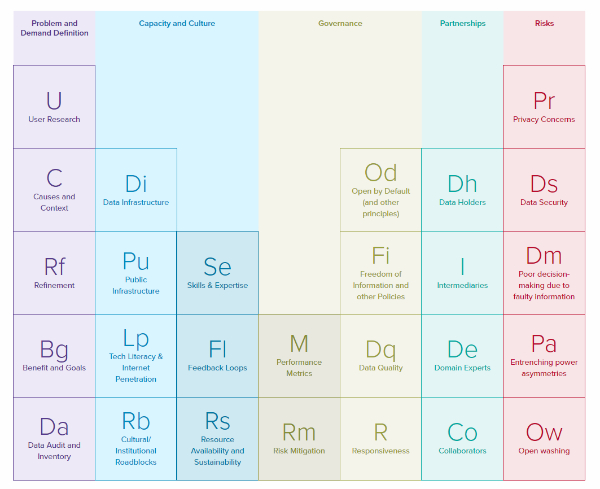
Community understanding of water pollution
The Environmental Data & Governance Initiative created a tool for civil society organizations, journalists, public entities, and educators interested in the environment to monitor water pollution and the source of contaminants in their communities. This application, called Watershed Notebook, allows writing and sharing Python code and is accessible from the Google Colab platform, which helps visualize data without writing complex lines of code.
The tool was created so that interested people can easily access and understand public information from government institutions in charge of water monitoring and protection. From there, these people will be able to exercise actions such as developing lobbying campaigns or a class action lawsuit against a drinking water facility that is not fulfilling its duty.
To learn more about this application and its use, you can consult the tool’s user manual that the organization published on its website.
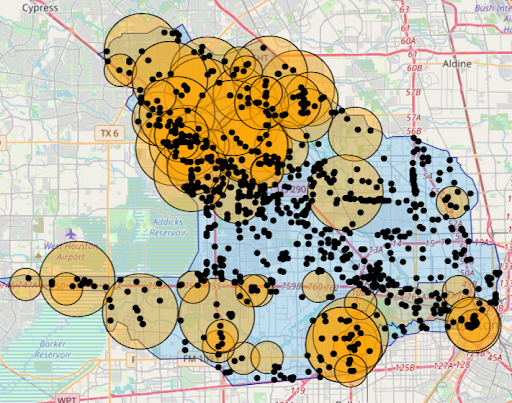
How to improve employment and labor surveys?
The World Bank has just published a guide to improve these measurements. It presents a “labor module” that allows for a comprehensive study of the participation of the working-age population in various forms of employment. Thus, the data collected can produce general labor market and underutilization indicators and more recently established indicators on the production of goods for own use.
The target audience includes statisticians, social scientists, and survey professionals in national statistical offices, international and development organizations, and academic institutions.
See the summary at this link or access the full document here.
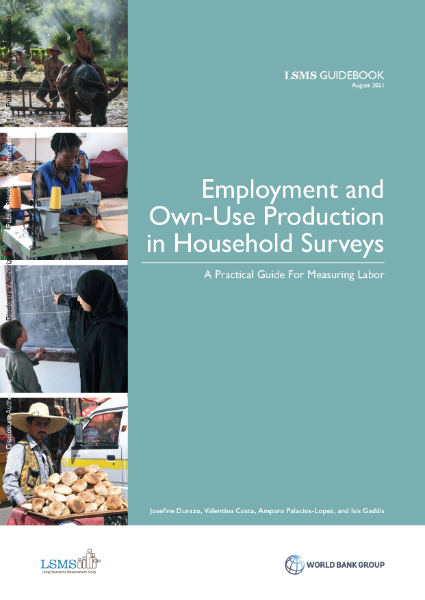
#BOOK
Data Science for Social Good
Springer Publishing recently published Data Science for Social Good: Philanthropy and Social Impact in a Complex World, a collection of analyses on different data-related topics from members of civil society organizations working in this area.
The book examines the application of knowledge from computer science to challenges such as humanitarian response and sustainable development. It also presents a scientific approach to social impact and complementary perspectives from philanthropists innovating in the sector.
The viewpoints of people working with data science to make a social impact are essential references and allow reflection on how these can be applied to other people or organizations’ work.

That's all for now!
If you liked this content, we invite you to share it! If you have reached us through social networks or have been forwarded this newsletter and want to receive it in your email twice a month, please subscribe!
We have other newsletters that may interest you in Data Journalism and Data Culture.




